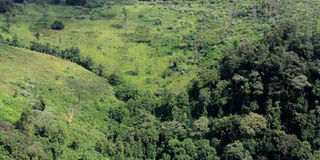Ensure all those destroying the forests leave, or else we perish

An aerial photo of Mau forest, Narok County, taken on September 4, 2019. The destruction of forests does not bring wealth. PHOTO | JOAN PERERUAN | NATION MEDIA GROUP
What you need to know:
- All Kenyans should be planting trees like crazy and nursing the forests we have with as much care as they do a newborn.
- The tourism ecosystem of the Maasai Mara and the miracle of the great wildebeest migration is nourished by this great forest.
Nobody, in this day and age, should be getting into a forest, cutting the trees, burning down the place for charcoal, or to make way for patches of agriculture.
Poverty is not a good reason for that. A peasant who destroys the environment condemns his children to a fate twice as bad as his.
By 2050, if we don’t act responsibly, Kenya will be like the town of Dirt in Rango: bone dry, waterless and so corrupt that the powerful will be hoarding the little water there is and condemning the rest to an almost certain death.
All Kenyans, wherever they live, should be planting trees like crazy and nursing the forests we have with as much care as they do a newborn.
Our lives, those of our children and grandchildren, depend on it. Why? Because we have destroyed most our forests, nearly all our springs and streams have disappeared.
The destruction of forests does not bring wealth.
WATER TOWER
If it did, we would be walking around in garish designer camo, or driving a fleet of Nissan Patrol Nismo in matt finish, with gold in every finger, ankle, toe, waist and neck.
As it is, the folks in the forests are some of the poorest. Believe me, it would make very good sense to pay out of the public purse all the farmers in the Mau to leave the forest.
The Mau Forest complex — which has been severely destroyed by the elite, some of it made up of politicians and senior public officials, former and present, using peasants as human shields and a captive catchment for votes — is one of God’s biggest gifts to our nation.
It is the source of 12 of our most important rivers and feeds five of our biggest lakes.
It’s big; almost half a million hectares, straddling five counties — Bomet, Narok, Kericho, Nakuru and Uasin Gishu.
Almost all of it, 21 out of a total 22 forest blocks, is protected forest land.
LAND GRABBING
The southern part of it, what we call the Maasai Mau Forest in Narok, is trust land and this is what is being destroyed as we speak.
Maasai Mau has been plundered by powerful folks from Narok who “sold” the land, whether to their friends in the elite, or colluded with government officials to create illegal settlements in forest land.
When a politician does not want to solve a problem, they form a commission or task force. The Mau has seen enough of them.
There was Ole Ntuntu in 1986 (at least this one produced boundaries), Sambu Task Force (1996), Ndung’u Land Commission (2004), Inter-Agency Assessment (2008), Legal Experts (2011) and the Lord-knows-what-else.
At least one thing many of these commissions and task forces seem agree on: The settlements are illegal; the title deeds irregularly issued.
Make no mistake: The Maasai Mau Forest has been extensively destroyed.
In 1990, 43,839 hectares were under forest over; today, only half of that, 26,867, is still forest.
ECOSYSTEM
If we are to listen to all those clever politicians who see the moves to restore the forest as a plot to prevent Deputy President William Ruto from getting to the presidency and do nothing about this, there will be no forest left by the time of the next election.
Would that be a big deal? Yes. The Maasai Mau is the source of five rivers, one which drains into Lake Natron, where the flamingos breed.
Another is the main tributary of the Mara River, which supports the Maasai Mara and the Serengeti in Tanzania.
The tourism ecosystem of the Maasai Mara and the miracle of the great wildebeest migration is nourished by this great forest.
If you were to calculate the value of the crops and charcoal that the settlers are getting out of destroying the forest and the catastrophic loss well into the future that the country stands to suffer, it makes sense for the cultivators to be removed and put — if need be — on a state pension.
Now, there will be arguments as to whether it is right or wrong to pay compensation to someone whose claim to the property is contested.
EVICTION
But to me, that is a side issue. The key issue is that forest cultivators, charcoal burners and poachers must leave all forests, not just the Maasai Mau.
The only people who should be allowed to live in the forest are hunter-gatherers, whose activities protect and do not harm the environment.
Kenya is an over-politicised country. We have elevated politics above food, clean air, even the future of our children.
The whole political thing is not based on the interests of the country and its people; it is a Category 5 con game.
Transient considerations trump everything, including common sense. And this is not right.
I don’t advocate the brutalising of those poor folks in the forest; I think they should be taken care of in the best way possible.
If need be, Kenyans can come together and raise money to buy them alternative land. It will be worth it in the long run.
But we must protect the environment and we must encourage Environment Cabinet Secretary Keriako Tobiko to finish the job.





